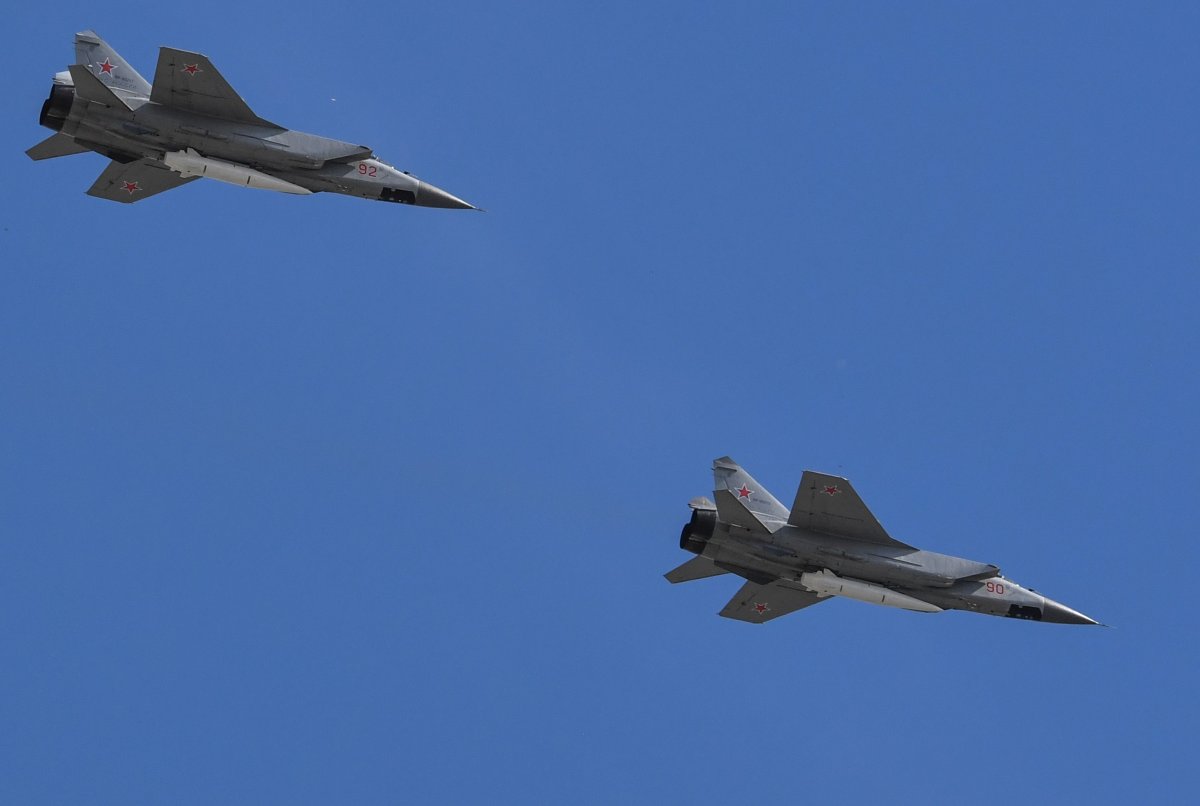At least 12 scientists in Russia have been detained in politically motivated arrests linked to Russian President Vladimir Putin's much-touted hypersonic missile program, it has been reported. Three have died since their arrests.
Yevgeny Smirnov, a lawyer who represented the defendants, told news outlet BBC Russian that FSB sources told him every accusation was reported to Putin, and the arrests were to demonstrate that Russian missile technology is being hunted down. The cases aimed "to show that Russian missiles are the best and that they are trying to steal them," Smirnov told the outlet.
In March 2018, Putin boasted to Russian lawmakers about Moscow's hypersonic missile program. He described the hardware as "super weapons," which are faster and more agile than standard ones and harder for missile defense systems to intercept. Newsweek has contacted the Kremlin by email for comment.

Among them is the Kh-24 Kinzhal ("Dagger"), which Russian forces have regularly used in their full-scale invasion of Ukraine to hit infrastructure in cities.
However, any connection to the program appears to come at a high risk, according to BBC Russian, which reported that at least a dozen scientists have been accused of transferring secrets about the program to other countries. The outlet said those detained were not even involved in weapons development and were simply working with foreign partners on the fundamental science.
Those arrested had been working at the Central Mechanical Engineering Research Institute (TsNIIMash), in the Moscow region; the Central Aerohydrodynamic Institute (TsAGI) in the Russian capital; as well as at the Khristianovich Institute of Theoretical and Applied Mechanics (ITPM) in Siberia.
ITPM director Alexander Shiplyuk and researchers Anatoly Maslov and Valery Zvegintsev were arrested in May 2023, accused of passing secrets to China.
Shiplyuk had insisted the information in question was not classified and was freely available online, Reuters reported. The trio's arrests prompted colleagues to publish an open letter, saying that the case threatened to damage Russian science.
Zvegintsev founded the high-speed aerodynamics laboratory at the institute. He collaborated with his former colleague, associate professor at Tomsk Polytechnic University, Vladislav Galkin, whose arrest was reported in December 2023.
TASS, Russia's leading news agency, reported that a treason case could be linked to a 2021 publication in an Iranian scientific journal.
Putin has ordered the jailing of at least 12 hypersonic technology developers.
— Anton Gerashchenko (@Gerashchenko_en) February 2, 2024
Among them: Anatoly Maslov, Alexandr Shiplyuk, Valery Zvegintsev, Vladislav Galkin, Anatoly Gubanov, Valery Golubkin, and others. All are charged under the article on "state treason," allegedly for… pic.twitter.com/4GAVKgBZjC
Maslov, Zvegintsev, and Shiplyuk, TsAGI and TsNIIMash were involved in the European Union's FP7 program, which allocates funds for space research.
Meanwhile, in October 2023, TsAGI physicist Anatoly Gubanov was sentenced to 12 years in a maximum-security colony. He had been arrested in April 2021 and denied charges of passing materials to colleagues in the Netherlands, with whom he collaborated on the HEXAFLY-INT, the world's first civil hypersonic airliner.
His colleague Valery Golubkin was also arrested but denied the charges against him. However, he was sentenced to 12 years in prison in June 2023.
TsNIIMash physicist Vladimir Kudryavtsev faced a treason case, but the 78-year-old died of complications linked to cancer before he could stand trial, Russian media outlet RBC reported.
Another TsNIIMash scientist, Roman Kovalev, was sentenced to seven years in 2020 but released due to ill health and in April 2022 died of cancer, state news agency Interfax reported. Dmitry Kolker from the Siberian Branch of the Russian Academy of Sciences also died.
Six other employees from the institutions have also been accused of treason, BBC Russian reported, without naming them.
Uncommon Knowledge
Newsweek is committed to challenging conventional wisdom and finding connections in the search for common ground.
Newsweek is committed to challenging conventional wisdom and finding connections in the search for common ground.
About the writer
Brendan Cole is a Newsweek Senior News Reporter based in London, UK. His focus is Russia and Ukraine, in particular ... Read more





